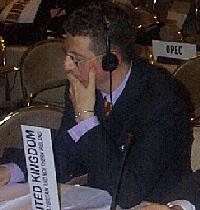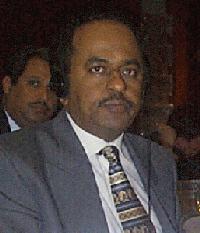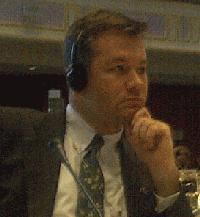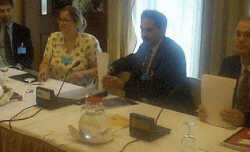Published by the International Institute for Sustainable Development
(IISD)
Vol. 12 No. 80
Friday, June 05 1998
HIGHLIGHTS FROM THE MEETINGS OF THE FCCC SUBSIDIARY BODIES
4 JUNE 1998
Delegates to the Subsidiary Body for Scientific and Technical Advice (SBSTA)
deliberated on methodological issues, the roster of experts and technology transfer. The
Subsidiary Body for Implementation (SBI) discussed national communications from non-Annex
I Parties, the financial mechanism, adverse effects of climate change and impacts from
responses, FCCC finance and administration and NGO participation.
SUBSIDIARY BODY FOR IMPLEMENTATION
On financial and technical support and GEF action on non-Annex I communications, the
Secretariat stated that eight initial communications have been received, 23 are expected
in 1998 and 30 in 1999. The deadline was March 1998. The EU and others called for a COP-4
decision on in-country expert reviews. The G-77/CHINA highlighted financial and technical
constraints and capacity building for adaptation. SRI LANKA stressed all-region adaptation
training. THAILAND noted difficulties with the adaptation assessment model. GEORGIA and
AZERBAIJAN stressed continuing GEF support. Assistance was requested for: finance and
know-how (MOROCCO); technical needs (BURKINA FASO); longer-term implementation (the
CENTRAL AFRICAN REPUBLIC, ARGENTINA); vulnerability (ARGENTINA); emission mitigation in
other sectors and formulation of implementation programs (URUGUAY, ARGENTINA); and second
national communications (SENEGAL, MEXICO).
The G-77/CHINA reminded UNEP and UNDP that they are implementing agencies of the
operating entity of the financial mechanism. NIGERIA suggested GEF sub-regional offices
for project monitoring. BURKINA FASO, THAILAND, and AZERBAIJAN called for translations of
guidelines. SENEGAL, with ARGENTINA, noted constraints on translation and dissemination of
communications. The EU and AUSTRALIA stressed accelerating submission of initial
communications, assisted by GEF. UZBEKISTAN stressed information exchange for Central
Asia. BENIN requested facilitation of conference attendance from Africa.
On the financial mechanism, the Chair noted review of the FCCC's financial mechanism
must be completed with a COP-4 decision. On guidance to the GEF, the Chair noted new needs
since 1996 guidance was provided. The G77/CHINA called for: GEF adherence to COP guidance;
no funding of activities inconsistent with FCCC principles; and, with EGYPT, attention to
adaptation measures. EGYPT called for long-term sustainability. CHINA called for: a more
streamlined project approval process; transparency in incremental cost calculation, and,
with IRAN, no conditionalities attached to the activities of multilateral funding
institutions, which was opposed by CANADA.
 The EU
distinguished GEF review from future guidance; and, with SWITZERLAND, CANADA and
VENEZUELA, proposed making it the permanent FCCC financing mechanism, subject to future
reviews. SWITZERLAND stressed adequacy and predictability in the flow of funds. With
AUSTRALIA, he noted a draft decision. The EU
distinguished GEF review from future guidance; and, with SWITZERLAND, CANADA and
VENEZUELA, proposed making it the permanent FCCC financing mechanism, subject to future
reviews. SWITZERLAND stressed adequacy and predictability in the flow of funds. With
AUSTRALIA, he noted a draft decision.  SAUDI
ARABIA cautioned against a premature conclusion. CANADA supported CDM support for
adaptation activities. JAPAN said it contributes 20% of GEF funding and called for
extensive evaluation. IRAN criticized a GEF overemphasis on energies. The Chair asked Dan
Reifsnyder (US) and John Ashe (Antigua and Barbuda) to chair a contact group to prepare a
draft decision. SAUDI
ARABIA cautioned against a premature conclusion. CANADA supported CDM support for
adaptation activities. JAPAN said it contributes 20% of GEF funding and called for
extensive evaluation. IRAN criticized a GEF overemphasis on energies. The Chair asked Dan
Reifsnyder (US) and John Ashe (Antigua and Barbuda) to chair a contact group to prepare a
draft decision.
On implementation of Article 4.8 and 4.9 (adverse effects and impacts of responses),
the Chair explained that consideration of Decision 3/CP.3 and the related Protocol
Articles 2.3 and 3.14 had been added to the agenda item, as per a COP-3 request. The
Secretariat introduced documentation (FCCC/SBI/1998/CRP.1), offering an analytical
framework to facilitate a response that is compatible with the Protocol. BURKINA FASO
called for an ad hoc committee, supported by the Secretariat, to assess Annex I Party
efforts and report to the COP.
The G-77/CHINA, supported by the  MARSHALL
ISLANDS, suggested a role for SBSTA and the possible need for an expert meeting before
COP-4. The MARSHALL ISLANDS also called for regional workshops on adaptation. SAUDI ARABIA
proposed, inter alia, that: the Secretariat's analytical framework combine consideration
of adverse effects and impacts; SBI form a permanent committee on implementation of
Articles 4.8 and 4.9; COP-4 request information from Annex I Parties on policies and
measures, fossil fuel imports during the first commitment period and estimated effects on
other imports from developing countries; and processes not discriminate against any
country clusters identified in Articles 4.8 and 4.9. MARSHALL
ISLANDS, suggested a role for SBSTA and the possible need for an expert meeting before
COP-4. The MARSHALL ISLANDS also called for regional workshops on adaptation. SAUDI ARABIA
proposed, inter alia, that: the Secretariat's analytical framework combine consideration
of adverse effects and impacts; SBI form a permanent committee on implementation of
Articles 4.8 and 4.9; COP-4 request information from Annex I Parties on policies and
measures, fossil fuel imports during the first commitment period and estimated effects on
other imports from developing countries; and processes not discriminate against any
country clusters identified in Articles 4.8 and 4.9.
AOSIS stressed the urgency of the question of insurance and, with the MARSHALL ISLANDS,
viewed the additions to the agenda item as technical rather than substantive. The EU
favored CDM support for adaptation, but stressed a focus on mitigation. He noted that
action on Article 4.8 must await more certainty on effects on fossil fuel use, calling for
further input and discussion. VENEZUELA opposed limiting action to studies and called for
a COP-4 decision. The US asked for more time for comment. SAUDI ARABIA opposed delaying
formation of a contact group on this.
The Chair introduced discussion on involvement of NGOs and called for consensus at
SBI-8. The US, opposed by the EU, called for including labor, agriculture, and
quasi-governmental entities. SWITZERLAND extended this to all Agenda 21 major groups. The
US, SWITZERLAND and CANADA opposed current exclusion of NGOs from the contact group on
flexibility mechanisms. General support was expressed for Chair discretion on NGO access
to informal meetings. The CLIMATE ACTION NETWORK asked for a proposal for additional
participation and transparency in registration. An industry representative called for
greater access to informal meetings with the Chair.
SUBSIDIARY BODY FOR SCIENTIFIC AND TECHNICAL ADVICE
On methodological issues, the US and EU stressed keeping the guidelines under review
and incorporating additional methodological issues raised by the Kyoto Protocol. Supported
by POLAND, HUNGARY underscored the need to enhance understanding of the three new gases
under the Kyoto Protocol. POLAND said that there is a need to conduct further work on
emission factors since these differ for different sectors, between and within countries.
He called for guidelines for the preparation of default projections. The Chair proposed a
workshop on national communications and another with the aim of addressing the problems
identified by SBSTA.
Some countries, including JAPAN and the US, noted the urgent need for a decision on
which anthropogenic activities should be included because it influences the ability of
some countries to ratify and implement the Protocol. The EU reaffirmed that inclusion of
sink activities should not undermine incentives for action on gross emission mitigation.
AUSTRALIA and the US suggested prioritization of issues. MAURITANIA, with ICELAND,
cautioned against concentrating solely on forests and conservation. AOSIS expressed
concern over "blanket" inclusion in sinks of all land use and forestry
activities as this would introduce uncertainties and distract the Protocol from focusing
on fossil fuel dependence. COLOMBIA stressed that technical aspects of Article 3.3, such
as establishing what is meant by net change in stock, must be resolved. Addressing Article
3.4 depends on the will of some Parties. NORWAY and CANADA sought to establish a process
to enable COP-5 to consider sinks.
Several delegations said SBSTA should call on IPCC to address outstanding technical
questions in a special report. The EU called for work on methodologies for quantifying
changes in soil carbon as a result of forest activities since 1990, and on whether the
current revised 1996 IPCC guidelines allow for transparent reporting and verfication. With
AOSIS, JAPAN, the US and AUSTRALIA, he sought clarification of the IPCC terms and
definitions of afforestation, reforestation and deforestation. ICELAND said improvements
to degraded land should be included in the list of human-induced activities. With the US,
he said IPCC should evaluate the consequences of limiting activities that can be included.
The US also highlighted, inter alia: effects of cropland and rangelands; improvements in
forest management; and inventory and data reporting.
SOUTH AFRICA, supported by BURKINA FASO, said SBSTA should task the IPCC to examine,
inter alia, methods for distinguishing natural and anthropogenic sinks, the role of carbon
stocks and wood products, definitions of eligible land uses and the role of sinks in
biodiversity protection.
CANADA said the capacity of agricultural soils presents a global opportunity for
promoting sustainable farming and said soil sink projects should be included under the
CDM. The US cautioned against delays in the CDM process and said sink-related activity
must move forward in the project-based process. Some delegations, including CANADA, JAPAN
and the US supported continuing discussions informally. The EU, NORWAY, DENMARK, COLOMBIA
and ENVIRONMENTAL NGOs stressed links to other conventions, including those on
biodiversity and desertification. Paul Maclons (South Africa) and Maciej Sadowski (Poland)
will chair a contact group on the request to IPCC.
ICELAND, supported by AUSTRALIA, expressed concern over the difficulties posed to small
countries arising from the setting of quantified limits on single project emissions and
called for the adoption of a threshold value for significant proportional impact and
separate reporting of process emissions. AOSIS expressed concern that a poor message will
be sent if exemptions are listed when the Protocol is adopted. The US said additional
accommodations must be cautiously approached. The EU recalled that differences are already
addressed by differences in quantified emission reductions and was reluctant to give
exceptions for single projects. SWITZERLAND said a separate methodological process would
threaten credibility. The Chair asked Iceland to provide more information to the Parties.
On technology transfer, the G77/CHINA explained that the poor responses to the surveys
to establish needs can be attributed to the absence of specific frameworks for the
implementation of the Convention. AUSTRALIA called for the identification of synergies in
technology transfer work under other Conventions. Together with the US, he noted that
national communications of non-Annex I countries would be helpful in identifying
technology needs and underscored the role of the private sector in furthering this sector.
The EU expressed hope that the flexibility mechanisms proposed under the Kyoto Protocol
would facilitate the transfer of technology.
CANADA said expertise in responding to questions already exists in the private sector
and research centers. URUGUAY noted the need to transfer concrete emission reduction
projects, not just surveys and reports. He recommended a financial mechanism for
technology transfer. CHINA said the issue of technology transfer had been marginalized and
noted that it is different from information centers. COP-4 should address this as a
separate agenda item. CHILE saw much potential for technology transfers through the CDM.
On the issue of technology information centres, delegates called for: the
identification and assessment of means to improve the flow of information and technology;
the establishment of regional centres, greater engagement of the private sector;
consideration of needs and participation of beneficiaries; and the need to develop,
strengthen and use existing institutions.
On technology work programmes, comments addressed: improved government coordination;
identification of barriers to transfer; incentives for transfers by the private sector;
and a September deadline for submissions on the work programme. A contact group will
consider technology transfer.
SPECIAL EVENT
In a special event, the  World Bank
stressed that the Prototype Carbon Fund (PCF) is not a scheme for the facilitation of
emissions trading rights, but aims to demonstrate a means for carrying out project-based
emissions trades in an efficient and equitable manner. The World Bank is not aiming to
monopolize the future trading market, nor seeking a privileged position under the FCCC. It
will not bring the PCF to the Bank's Executive Board for approval until after COP-4. (Full
presentation available in RealAudio: World Bank
stressed that the Prototype Carbon Fund (PCF) is not a scheme for the facilitation of
emissions trading rights, but aims to demonstrate a means for carrying out project-based
emissions trades in an efficient and equitable manner. The World Bank is not aiming to
monopolize the future trading market, nor seeking a privileged position under the FCCC. It
will not bring the PCF to the Bank's Executive Board for approval until after COP-4. (Full
presentation available in RealAudio:
 PART 1 PART 1
 PART 2) PART 2)
IN THE CORRIDORS
Observers have noted that European Union Parties are again locked in internal and
prolonged debates over burden sharing, as the implications of the Kyoto Protocol are
gradually absorbed by a number of member states. The debates are now focused on policies
and measures. Some have observed that a significant gap exists between the European
Union's top-level experts feeding into the Union's negotiating position at the FCCC and
the capacity of home ministries' "delivery agents" to deliver the promised
results, with all the consequences that could entail for the post-Kyoto process.
THINGS TO LOOK FOR
SBI: SBI will meet at 10:00 am in the Maritim Room
AG13: AG13 will meet at 10:00 am and 3:00 pm in the Beethoven Room.
SBSTA: SBSTA will meet at 3:00 pm in the Maritim Room. |

 The EU
The EU SAUDI
ARABIA
SAUDI
ARABIA MARSHALL
ISLANDS
MARSHALL
ISLANDS World Bank
World Bank PART 1
PART 1